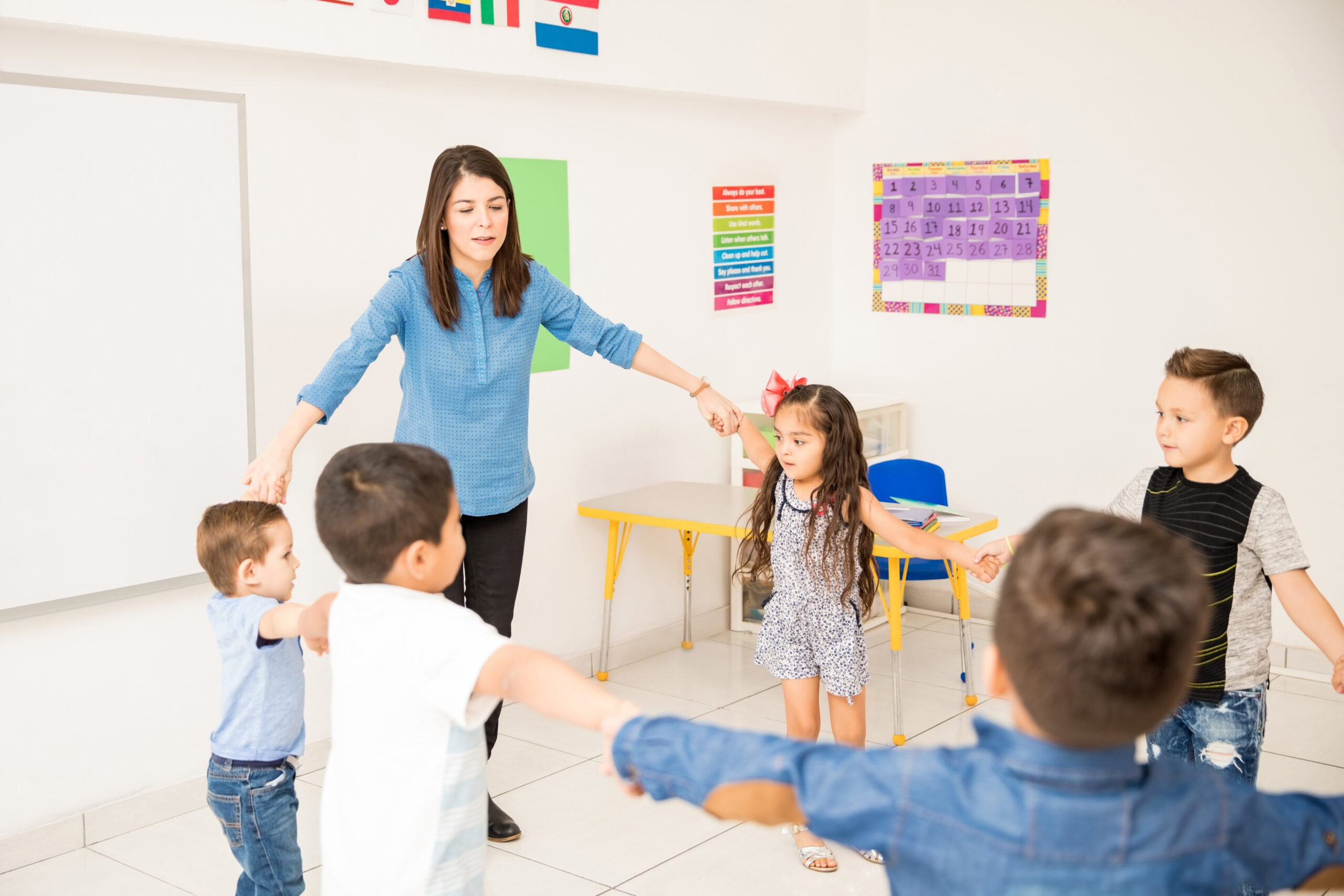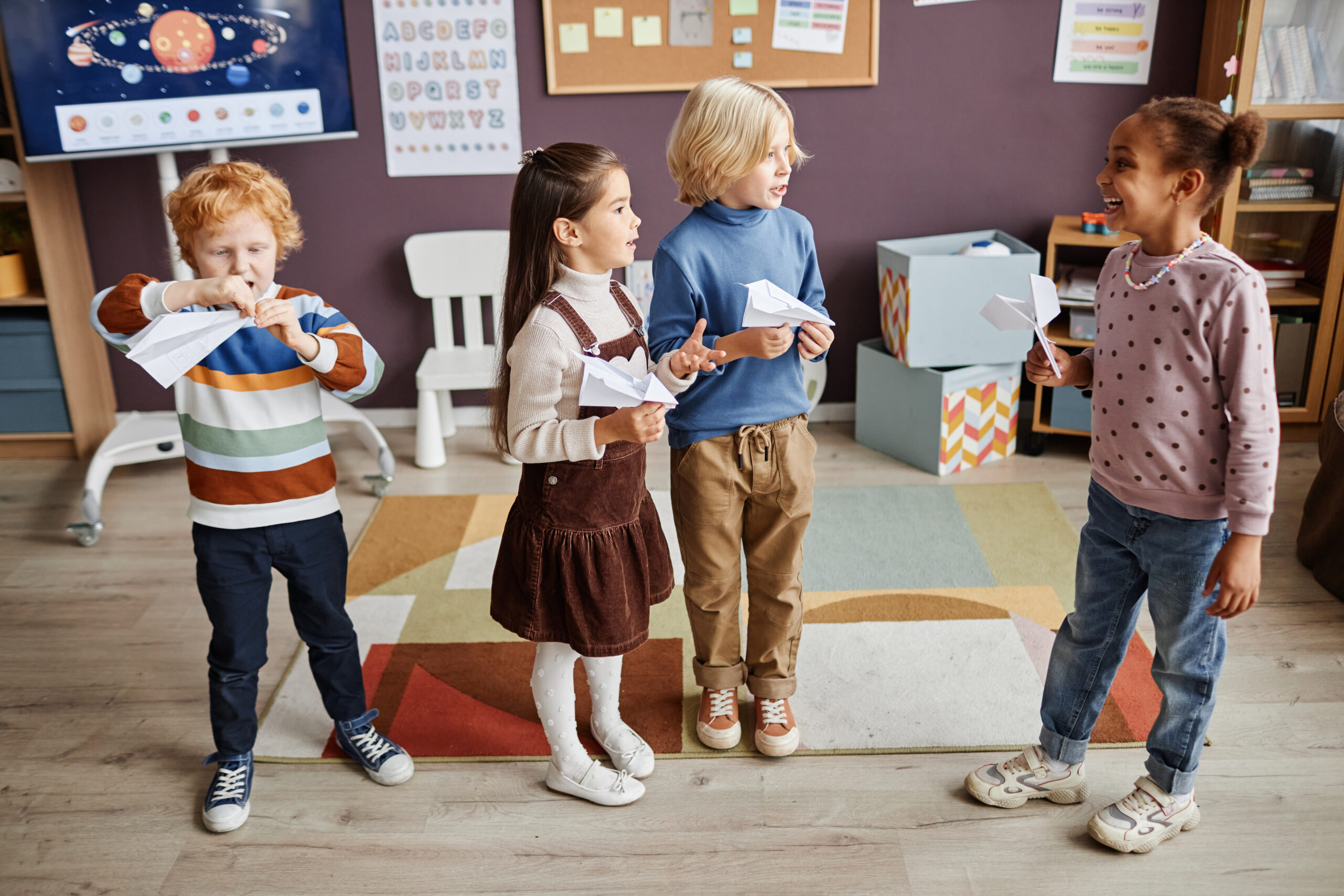What if the best learning tool for your preschooler wasn’t a workbook or a computer, but a box of blocks, a pretend kitchen, or a game of tag?
At Open Doors Preschool, we understand that play isn’t just fun, it’s foundational. Backed by decades of research in child development, psychology, and neuroscience, play-based learning has proven to be one of the most effective ways for young children to develop essential skills for life.
Let’s take a closer look at what the science says about play, and why it’s the heart of our preschool philosophy.
What Is Play-Based Learning?
Play-based learning is an educational approach that uses child-directed, imaginative, and meaningful play as the primary way of learning. Children explore, make choices, solve problems, and express themselves – all within the context of play.
At Open Doors Preschool, this can look like:
- Building structures in the block area
- Pretending to be chefs or veterinarians in dramatic play
- Digging and measuring in sensory bins
- Singing and dancing during circle time
- Investigating nature in the school garden
Each of these playful experiences is intentionally designed to promote development across multiple domains – cognitive, social, emotional, and physical.

The Neuroscience of Play: Building Brains Through Fun
1. Rapid Brain Growth in the Early Years
By age five, a child’s brain reaches nearly 90% of its adult size. During these years, the brain is forming more than 1 million new neural connections per second, and it’s highly responsive to experiences.
Play provides the kind of rich, multisensory input the brain craves. Activities like stacking blocks, sorting buttons, or pretending to fly engage the brain’s problem-solving, motor, and emotional centers all at once.
In short, when children play, their brains are not “taking a break,” they’re firing on all cylinders.
2. Executive Function and Self-Regulation
One of the strongest predictors of school and life success isn’t IQ – it’s executive function. These are the brain’s self-management skills, including:
- Impulse control
- Working memory
- Flexible thinking
- Focus and attention
Research from Harvard’s Center on the Developing Child shows that pretend play helps children practice these functions. For example, when playing “grocery store,” kids must remember roles, follow imaginary rules, and adapt when something changes — all crucial executive skills.
3. Play Reduces Stress and Builds Emotional Intelligence
Play also triggers the release of dopamine, a brain chemical linked to joy, motivation, and emotional regulation. When children engage in play, they are naturally regulating their emotions and developing resilience.
Pretend play, especially, lets children process big feelings. A child acting out a doctor’s visit, for example, may be exploring their own anxieties, giving them a safe way to understand and cope with emotions.
At Open Doors, we prioritize emotionally responsive environments where children feel safe to explore their feelings through play.
Cognitive Growth: Learning Without Flashcards
Play-based learning promotes all the foundational skills children need to succeed in school – without worksheets or rote memorization.
Literacy Through Play
- Storytelling in pretend play builds narrative skills
- Singing songs and rhymes enhances phonemic awareness
- Scribbling menus in dramatic play boosts early writing skills
Math Through Play
- Sorting, counting, and measuring in sensory bins
- Patterning with beads or tiles
- Estimating and comparing sizes in block construction
Science Through Play
- Observing bugs in the playground
- Mixing colors or watching ice melt
- Planting and watching seeds grow
All of this learning feels natural and enjoyable – not forced. And when learning is joyful, it sticks.
Social & Emotional Development: The Heart of Play
Young children are learning how to navigate relationships, understand others, and manage their own feelings. Play provides the perfect space to practice:
- Taking turns in a game
- Cooperating on a group project
- Resolving conflicts over toy choices
- Developing empathy during role-play
These “soft skills” aren’t extra, they’re essential. And play helps children internalize them without lectures or lessons.
The Role of Teachers in Play-Based Learning
At Open Doors Preschool, our teachers do more than supervise play, they guide it with purpose and expertise. This means:
- Setting up environments rich in learning opportunities
- Observing children’s interests and following their lead
- Asking open-ended questions that extend thinking
- Encouraging reflection and problem-solving
For example, when two children are building a bridge, a teacher might say:
“What could you add to make it stronger?” or “How will cars get across?”
This kind of gentle guidance turns a playful moment into a deeper learning experience — without ever interrupting the joy of discovery.
Research That Supports Play-Based Learning
Play-based learning is not a trend, it’s supported by decades of credible research, including:
- The American Academy of Pediatrics: Emphasizes play as essential to healthy brain development
- Harvard University’s Center on the Developing Child: Highlights play’s role in building executive function
- National Association for the Education of Young Children (NAEYC): Advocates for play as a key component of high-quality early learning
In fact, countries with play-focused preschool systems (like Finland and Sweden) consistently outperform others in long-term educational outcomes, proving that early play leads to later success.

What Play Looks Like at Open Doors Preschool
We design every part of our program to support learning through play. Here’s how:
Thematic Learning Centers
From a pretend post office to a STEM exploration table, our rotating centers reflect children’s interests and developmental needs.
Outdoor Exploration
Our outdoor play areas are more than recess, they’re environments for learning about nature, physics, and cooperation.
Art and Music
Children express themselves through creative media, building fine motor skills, confidence, and emotional awareness.
Project-Based Learning
When a group of children becomes fascinated by dinosaurs or construction, we dive deep with books, experiments, dramatic play, and crafts – led by their curiosity.
Why Parents Choose Open Doors Preschool
Families choose Open Doors because we blend joy with purpose. Our play-based curriculum:
- Respects how children naturally learn
- Builds academic, social, and emotional foundations
- Encourages curiosity, independence, and resilience
- Prepares children for kindergarten – and life beyond
We don’t rush childhood. We enrich it.
Call to Action: Discover the Power of Play
If you’re looking for an early education program that’s joyful, research-backed, and deeply effective, Open Doors Preschool is the perfect fit.
Contact us today to schedule a tour or speak with our team. See how our play-based approach builds confident, capable learners, one joyful day at a time.
Let’s open the door to your child’s future, through the science of play.
Final Thoughts
The preschool years are not just preparation for real learning, they are real learning. Through play, children build the intellectual, emotional, and social skills they’ll carry for life. And science agrees: play is not a break from learning; it is learning.
At Open Doors Preschool, we honor that truth every day by offering an environment where children learn with their whole hearts, hands, and minds.
Let your child’s learning journey begin with joy. Choose play. Choose Open Doors.

